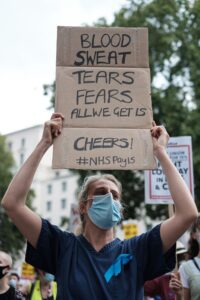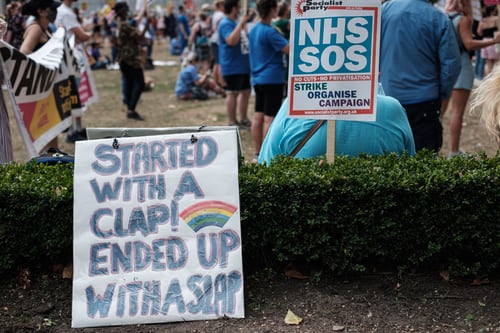25 March 2021
NHS Empty Gestures
Not good enough.
By Lynda Goetz
 ‘Gestures’ can sometimes be appreciated. Your bunch of flowers or bottle of wine, for someone’s non-significant birthday or the fact they’re cooking you dinner, may not be lavish, but it is enough to show you are thoughtful and care. The £500 (taxed in the case of Scotland but net in the recently announced Welsh ‘gift’) is a gesture likely to be appreciated by NHS staff in those countries. In the case of England, a generic thank you card from your local NHS Trust Board praising you as an ‘NHS hero’ and enclosing 5 ‘Seeds of hope and new beginnings’, ‘signed’ by the chief Executive and Chair might go down rather less well.
‘Gestures’ can sometimes be appreciated. Your bunch of flowers or bottle of wine, for someone’s non-significant birthday or the fact they’re cooking you dinner, may not be lavish, but it is enough to show you are thoughtful and care. The £500 (taxed in the case of Scotland but net in the recently announced Welsh ‘gift’) is a gesture likely to be appreciated by NHS staff in those countries. In the case of England, a generic thank you card from your local NHS Trust Board praising you as an ‘NHS hero’ and enclosing 5 ‘Seeds of hope and new beginnings’, ‘signed’ by the chief Executive and Chair might go down rather less well.
“Not” as the young doctor I know who received this pointed out, “that it isn’t a nice gesture, but, unless they’re magic beans, it is rather an empty one! At least if I’d received the Welsh gift I could have put it towards the £800 I have to pay for my next set of exams in June”. Although there will be many others, apart from those in the NHS, who have gone ‘above and beyond’ over the last year (as people covered for those on furlough or those sheltering or isolating), it does seem extremely unfair that both Welsh and Scottish NHS workers of all sorts are being given at least some small financial recognition of this extra work, whilst those in England are it seems getting nothing more than the recommended paltry NHS 1% pay rise, which will not even cover predicted inflation. On Wednesday evening the Scottish government offered its workers 4%. (This is not the time or place for a discussion on devolution, but this unfair scenario does highlight the political games being played with UK taxpayers’ money). Neither of these recommendations in fact apply to hospital doctors, dentists or GPs.
In the case of junior doctors they have, in real terms, taken pay cuts over the last ten years. Nurses are also feeling the pinch. It is no good people lauding our ‘NHS heroes’ – the public standing on their doorsteps banging saucepans and clapping as they did last summer or posting children’s prettily-drawn rainbows in their front windows – if we (and I say ‘we’ advisedly) are not prepared to remunerate them appropriately at the end of the day.

We can, of course, blame the government (and successive governments are to blame on this, quite clearly) but, how many people, if asked, are actually prepared to pay more tax to keep the NHS free at the point of delivery, which seems to be the model the public in this country are absolutely wedded to? In a survey carried out by The King’s Fund in 2017 it seemed that 61% would be. That still leaves almost 40% who would not expect or want to. Compared to many other professions, doctors are poorly paid. Whilst most do not go into it for the money, it would be reasonable to expect to be well-remunerated for a job in which people’s lives are in your hands, a job which requires not only five or six years before you start earning any money, but one in which in order to progress it is absolutely necessary to spend a further five to fifteen years doing further training and exams at your own expense and in your own time. (In the private sector much Continuing Professional Training – CPD – is paid for by employers and time-off allowed in which to attend conferences or prepare for exams).
As I have pointed out before in other articles about the NHS[i], most people do not understand the term ‘junior doctor’, which actually covers all those who have not attained the status of consultant. Depending on the speciality, it can take up to fifteen years to complete the necessary training and even once all the exams, assessments and years in the job have been completed, it may still take time to obtain a consultant post. This means that many junior doctors can be in their late 30s and 40s. That would not matter so much if in those preceding years junior doctors felt appreciated and appropriately compensated for the often gruelling hours and work which they have to do. It is standard in an intensive care unit (ICU) to work several 13-hour days on the trot. A so-called ‘short day’ is from 07.30 to 16.30 ish.
Those who have gone to say New Zealand or Australia fare far better in terms of both remuneration and working conditions. As a junior doctor wrote in The Independent at the beginning of March, his cousin, who graduated in the same year and works the same hours, earns nearly 600 percent of his salary in another country. Small wonder then that there are around 90,000 posts in the NHS which are currently unfilled, of which some 40,000 are nursing vacancies. The lack of these workers puts further pressure on existing staff and of course Covid has exacerbated these stresses. Not only is this a threat to the NHS, but two surveys last year revealed that around 30 percent of nurses are looking to leave the profession. In the Royal College of Nursing (RCN) survey, 61 percent cited pay as a factor. The added pressures of Covid, which will not stop with the end of the pandemic (whenever that might be declared to be) as there is now a massive backlog of other treatments waiting to be dealt with[ii], will only add to the feeling that the financial compensation is insufficient to make up for an extremely stressful work environment.

Much is clearly wrong in the NHS. Some of it the government recognises and has already acted upon. It is already trying to increase recruitment and home-grown training of the necessary staff. Brexit undoubtedly caused the exodus of EU staff, and they are being replaced by others from non-EU countries. Again, the King’s Fund (an independent charity founded in 1897 working to improve health care in the UK) has produced a report on the effect of Brexit on the health and care systems; however there is clearly more than the effects of Brexit impacting on the NHS currently. If it is to thrive rather than deteriorate, and those working on the frontline are going to continue doing so, then it is clear that, as has been pointed out endlessly, radical reform is needed.
Perhaps it is time for our government to look abroad and see how health services are paid for and work in those countries where both doctors and patients are happy with the way the system works and stop pretending that ‘our wonderful NHS’ is the envy of the world. It isn’t and hasn’t been for some long time now. The gestures, from governments and public, need to stop and proper action taken. Without this we won’t have an NHS to clap for. So much money has been wasted over the last year. Let us at least ensure that some of it is thrown in the right direction, rather than thrown away.
[i] Woke v. Open and Locum Doctors
[ii] e.g. 14 months’ worth in the ophthalmology department.


